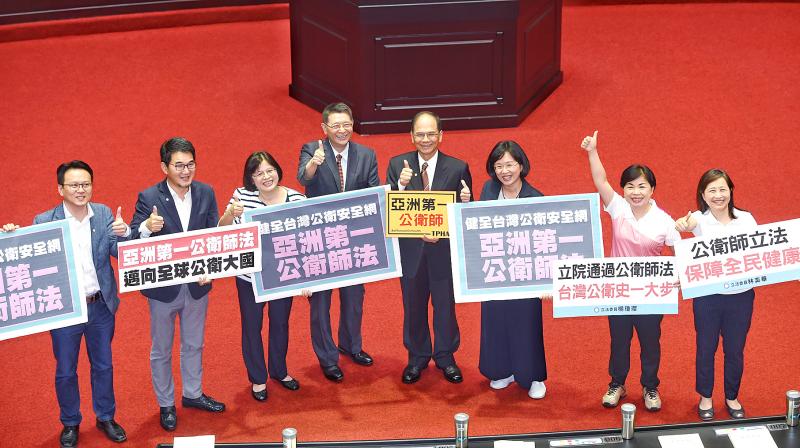In an effort to help students of public health apply their expertise in the workplace and enable the nation to face the challenges posed by new epidemics, lawmakers yesterday passed the Public Health Specialists Act (公共衛生師法), touting it as the first of its kind in Asia.
Under the act, those who pass an exam for public health specialists and have received a certificate can practice the profession. Those with a bachelor’s degree or higher in public health who have graduated from a local university or college, or an equivalent foreign institution recognized by the Ministry of Health and Welfare, are eligible.
Those who have graduated from the aforementioned institutions, but whose major was medicine or subjects related to public health, must have obtained at least 18 credits or have worked in public health for at least three years before they can take the test, it states.

Photo: Fang Pin-chao, Taipei Times
Local and foreign public health specialists must join a union, and abide by the nation’s laws and code of ethics governing public health specialists, as well as the charter of the national public health specialists union, the act states.
Public health specialists can work at medical facilities and long-term care facilities, or set up their own firm after practicing for two years, it states, while qualified medical personnel can double as public health specialists, but the latter must not perform the tasks of medical personnel.
The responsibilities of public health specialists include conducting environmental health risk assessments, pathological investigations, health surveys, food safety inspections and other tasks outlined by the Ministry of Health and Welfare in communities and public spaces, it states.
They should propose plans to prevent health risks and diseases, ensure food safety and boost public health, it states.
In the event of a major public health incident, emergency or contingency, the ministry can enlist a public health specialist to perform any of the aforementioned tasks, it states.
The specialist cannot reject the request without a valid reason; and those who contravene the regulation would face a fine of NT$20,000 to NT$100,000, and could be suspended for one month to one year.
Public health specialists who illegally lend their licenses to others would have their licenses revoked, the act states.
The passage of the act represents the fruition of a legislative effort that began in 2000 when the Taiwan Public Health Association began lobbying, Democratic Progressive Party Legislator Su Chiao-hui (蘇巧慧) said after the bill passed its third reading.
The world has faced a host of new epidemics in the past 20 years, such as SARS, Ebola and COVID-19, she said, adding that the increasingly daunting challenges posed by these diseases highlight the importance of professional civil servants.
The nation’s first public health colleges were established in 1972, but unlike medical colleges they were not covered by an education, testing, internship and recruitment system, Su said.
The act has established a professional system for public health personnel without affecting the rights of those already working in the sector, she said.

A Ministry of Foreign Affairs official yesterday said that a delegation that visited China for an APEC meeting did not receive any kind of treatment that downgraded Taiwan’s sovereignty. Department of International Organizations Director-General Jonathan Sun (孫儉元) said that he and a group of ministry officials visited Shenzhen, China, to attend the APEC Informal Senior Officials’ Meeting last month. The trip went “smoothly and safely” for all Taiwanese delegates, as the Chinese side arranged the trip in accordance with long-standing practices, Sun said at the ministry’s weekly briefing. The Taiwanese group did not encounter any political suppression, he said. Sun made the remarks when

The Taiwanese passport ranked 33rd in a global listing of passports by convenience this month, rising three places from last month’s ranking, but matching its position in January last year. The Henley Passport Index, an international ranking of passports by the number of designations its holder can travel to without a visa, showed that the Taiwan passport enables holders to travel to 139 countries and territories without a visa. Singapore’s passport was ranked the most powerful with visa-free access to 192 destinations out of 227, according to the index published on Tuesday by UK-based migration investment consultancy firm Henley and Partners. Japan’s and

BROAD AGREEMENT: The two are nearing a trade deal to reduce Taiwan’s tariff to 15% and a commitment for TSMC to build five more fabs, a ‘New York Times’ report said Taiwan and the US have reached a broad consensus on a trade deal, the Executive Yuan’s Office of Trade Negotiations said yesterday, after a report said that Washington is set to reduce Taiwan’s tariff rate to 15 percent. The New York Times on Monday reported that the two nations are nearing a trade deal to reduce Taiwan’s tariff rate to 15 percent and commit Taiwan Semiconductor Manufacturing Co (TSMC, 台積電) to building at least five more facilities in the US. “The agreement, which has been under negotiation for months, is being legally scrubbed and could be announced this month,” the paper said,

Japan and the Philippines yesterday signed a defense pact that would allow the tax-free provision of ammunition, fuel, food and other necessities when their forces stage joint training to boost deterrence against China’s growing aggression in the region and to bolster their preparation for natural disasters. Japan has faced increasing political, trade and security tensions with China, which was angered by Japanese Prime Minister Sanae Takaichi’s remark that a Chinese attack on Taiwan would be a survival-threatening situation for Japan, triggering a military response. Japan and the Philippines have also had separate territorial conflicts with Beijing in the East and South China